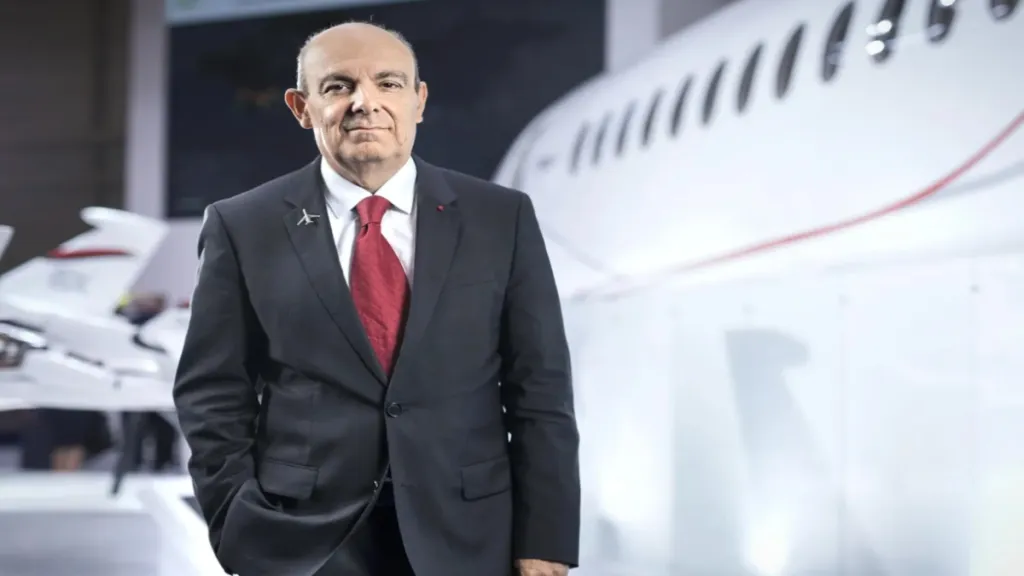
Dassault Aviation CEO Eric Trappier debunks Pakistan's claim of downing Rafale jets, reinforcing the fighter’s global reputation
In a defining moment for truth in international defense discourse, Dassault Aviation’s Chief Executive Officer Eric Trappier, has squarely confronted and dismissed Pakistan’s recent assertions regarding the alleged downing of Rafale jets. In a statement that cuts through ambiguity like the very jets in question cut through skies, the CEO labeled the claims as “inaccurate”, a diplomatic yet decisive takedown of misinformation.
“The aircraft’s reputation remains, rightfully, untouched.”, Dassault CEO
The Rafale, a flagship multi-role fighter aircraft manufactured by France’s Dassault Aviation, has long been considered the crown jewel of modern air combat capabilities. From unmatched agility and stealth to its battle-tested electronics and advanced weaponry, the Rafale is a name synonymous with air superiority. This declaration from the aircraft’s very creators not only safeguards its towering global reputation but also re-establishes confidence among defense analysts, strategic partners, and aviation enthusiasts.
Pakistan’s claim suggesting it had managed to shoot down a Rafale in an unspecified air operation was met with scepticism from the outset, not least because no tangible evidence supported the statement. The narrative, heavily circulated in regional media, appeared more an attempt to rattle perceptions than deliver verifiable fact. As defense experts began to raise eyebrows, the wait for an official response from Dassault became a ticking clock of anticipation.
That wait is now over.
The CEO’s statement was clear and confident. In reaffirming the unblemished service record of the Rafale, he emphasized that no such incident had occurred and that the aircraft’s reputation remains, rightfully, “untouched.” Such a direct clarification from the top signals Dassault’s unwillingness to allow misinformation to linger, especially when it could erode the trust of stakeholders across military, diplomatic, and industrial circles.
It also raises questions about the source and intent behind Pakistan’s claim. In the arena of global defense, information is power, and so is disinformation. In this case, Dassault’s counterstatement didn’t just defend a machine; it shielded a legacy. Rafale jets are operated by air forces around the world, including those of France, India, Egypt, and Greece. Their performance in both combat and peacetime roles has been widely documented and applauded. By reaffirming the credibility of these jets, Dassault is preserving not only its brand but the trust of entire air commands.
Dassault CEO’s Statement
The CEO’s statement comes at a time when geopolitical posturing is at a fever pitch across Asia. With global conflicts and regional tensions escalating, the symbolism of airpower is immense. Defense credibility is no longer just about machinery, it’s about perception, psychological deterrence, and maintaining confidence among partners and populations. That makes false claims more than just inconvenient, they’re strategically destabilizing.
India, one of the most prominent operators of the Rafale, has made significant investments in the aircraft as a part of its effort to modernize its air force and counter regional threats. Pakistan’s claim, therefore, could be read as an attempt to dent India’s defense prestige by targeting a high-value asset with a storied reputation. But that maneuver seems to have backfired. With Dassault stepping forward to reject the downing narrative, the attempt has only spotlighted the Rafale’s reliability and strategic value.
From a public relations standpoint, the response was flawless. It wasn’t needlessly aggressive. It didn’t invite escalation. But it was surgical in its message: misinformation will not be tolerated, and facts will always find their flight path. The use of the word “inaccurate” may seem modest, but in the world of diplomacy and defense, it hits like a missile lock. It signals professional indignation without unnecessary provocation.
More than just rebutting a falsehood, the statement revitalizes a broader conversation about media literacy and accountability in defense narratives. In an era where social platforms can amplify misleading content in minutes, such truth-bomb moments are necessary to recalibrate public discourse. Aviation enthusiasts and defense correspondents across the globe have rallied behind the statement, many praising Dassault for its clarity and composure.
Critics, however, caution that this should be a learning moment for both governments and media outlets to prioritize accuracy over sensationalism. Misreporting on military matters doesn’t just mislead audiences, it puts real-world lives and international relations at stake.
Global Operators of Rafale Jets
| Country | Number of Rafales | Key Operations |
| France | 152+ | Operation Chammal (ISIS) |
| India | 36 | Eastern border patrol, drills |
| Egypt | 54 | Anti-terror ops in Sinai |
| Greece | 24 (ordered) | Aegean surveillance |
At its core, this controversy and its resolution highlight something critical: the importance of transparency, evidence, and above all, integrity. As Pakistan’s narrative unravels, one thing becomes clear, Rafale’s legacy has not just survived the attack; it’s soared higher because of it.
Dassault Aviation’s swift, precise response reaffirms its role not just as a manufacturer of exceptional aircraft, but as a guardian of trust in aerospace excellence. And in a world where perception often drives policy, that trust is more powerful than any payload.
Stay updated with the latest news on Rapido Updates. Keep yourself updated with The World, India News, Entertainment, Market, Gadgets, Sports, and many more
1 thought on “Dassault Drops Truth Bomb: No Rafales Were Downed”